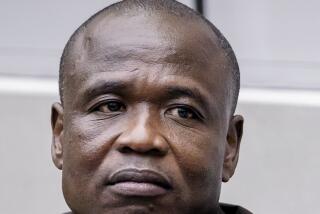Kenya Jails ‘Mama Alice,’ Who Led Disaffected Tribesmen : Magic Fades for Uganda’s Guerrilla Voodoo Priestess
- Share via
NAIROBI, Kenya — After captivating a battalion of believers who poured from Uganda’s countryside in a suicidal crusade against the government, the magic of voodoo priestess Alice Lakwena appears spent.
Some said the 27-year-old rebel leader was a medium of God, with a mission to liberate Uganda. Others called her demented. Ultimately, her Holy Spirit Movement became the most troublesome of the several insurgencies fighting the government of Ugandan President Yoweri Museveni.
Today, the woman known to followers as Mama Alice is behind bars in western Kenya after being arrested for entering the country illegally. Kenyan authorities announced her capture Wednesday and said she will be repatriated to Uganda after serving four months.
Over the past year, Lakwena inspired thousands of Ugandan rebels to march into battle singing hymns, their bare chests smeared with oil that they believed would ward off bullets. She armed them with sticks and stones, saying they would explode like grenades during battle.
Bullets From Bees
Rebel pamphlets enjoined fighters from taking cover during battle and included instructions on making bombs from animal parts, bullets from bees and magic oil from nuts.
The result was fearsome slaughters in battles with Ugandan troops, but still Lakwena was able to replenish her forces. At its height, the army numbered about 7,000.
Lakwena was born into an Anglican family of northern Uganda’s Acholi tribe and was said to have been a schoolteacher and a witch doctor.
She said her movement was directed by a spirit who sought to topple Museveni and liberate Uganda, using her as its medium. Lakwena means messenger in Acholi.
Documents seized from her troops showed a movement guided mostly by resentment over perceived slights to Uganda’s north by President Museveni, who took power in January, 1986, after a five-year guerrilla war.
North Felt Ignored
The documents charged that Museveni’s government, born of a southern- and western-based guerrilla force, ignored development in the north where remnants of earlier regimes, led by Idi Amin and Milton Obote, fled in the late 1970s and early 1980s to form insurgencies.
Museveni believed Lakwena was an unwitting tool of the former regimes, whose insurgencies were being battered by government troops.
“Having been defeated by modern machines, they have turned to the spirits,” he said in November during his army’s final assault on Holy Spirit forces.
“The real culprit is not this girl. This is simply a question of lawlessness being exploited by corrupt politicians,” he said.
The Holy Spirit Movement launched its first attack on government forces last January, when it was already 3,000 strong, according to government figures.
Wave after wave of rebels--smeared with oil and barely clothed--fell on army troops at the town of Kilak Corner, about 290 miles north of Kampala, the Ugandan capital. They were easily repulsed in what Museveni described as a “ferocious battle.”
Thousands more rebels died in subsequent attacks.
Launched October Drive
Museveni said the Holy Spirit army never posed any real threat to his government, but it did become the most persistently troublesome of about a half dozen insurgencies. In late October, when the rebels reached Uganda’s eastern Iganga district, Museveni launched his final offensive.
The Holy Spirit was reduced to a disorganized, dispirited and hungry force of several hundred who scattered into the hills.
Kenya’s minister of state, Justis Ole Tipis, said Lakwena was arrested Saturday with seven followers for crossing into Kenya without the proper documentation.
Before then, Lakwena had last been seen in late November fleeing on a bicycle pushed by some of her few remaining followers. She was believed to be trying to return to her northern homeland.
More to Read
Sign up for Essential California
The most important California stories and recommendations in your inbox every morning.
You may occasionally receive promotional content from the Los Angeles Times.













